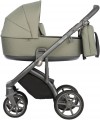Crotch strap
The presence of a separate
crotch strap in the design of the stroller. Only pushchairs with a bumper (see above) are equipped with such a strap: it is located vertically between the legs of a seated kid, preventing him/her from falling out by slipping under the bumper. In general, this design is similar in purpose to
three-point harnesses (see “Harness type”), however, in a stroller with a bumper and crotch strap, the child is usually less crowded. You should pay attention to the presence of this function when buying pushchairs.
Viewing window
A window made of transparent or translucent material, built into the hood that covers the cradle or seating unit. In the version with a walking block,
the viewing window is usually located so that the parent can see the baby directly while moving, without being distracted from controlling the stroller. In cradles, the parent can see the child through a window by approaching the stroller from the side of the hood (that is, on the opposite side of the handle); implementations with a window in the front hemisphere of the hood are less common. In addition, a baby lying in a cradle can usually see the outside world through the window (primarily the sky above the stroller). The viewing window can be made in the form of oilcloth or a mesh mosquito net, through the holes of which air freely penetrates, but insects and small debris raised by the wind are retained.
Front wheels diameter
The diameter of the front wheels installed in the stroller.
At the same time, the front wheels are not as important for mobility as the rear wheels: for example, to overcome obstacles, the stroller is often lifted "on its toes" by tilting it towards itself, with only the rear wheels working. Therefore, the diameter of the front wheels may be noticeably smaller than the rear wheels. It should be noted here that the small size also has its advantages — the wheels are lighter.
Speaking of specific numbers, diameter
up to 15 cm is considered very modest,
16 — 20 cm — small,
21 — 25 cm — medium,
26 — 30 cm is larger than average and
more than 30 cm is large.
Rear wheels diameter
The diameter of the rear wheels installed in the stroller.
The larger the wheel — the better it overcomes obstacles and bumps, the more convenient it is to drive the stroller over mud, snow and other difficult surfaces. For the rear wheels these moments are most relevant: for example, when driving the stroller over obstacles, it is usually tilted towards itself, so that the front wheels are in the air, and the rear wheels have to overcome the obstacle. On the other hand, small wheels weigh less and are easier to move, they are better suited for flat surfaces. So choose a stroller on this indicator should take into account the roads on which it has to be driven. If you plan to move on flat floors, good asphalt and stroller ramps — it is worth choosing small wheels, up to 20 cm. For difficult terrain, driving on mud and snow, regular overcoming steps and curbs it makes sense to pay attention to wheels in 30 cm and larger. And the diameter of 20 — 30 cm is an average option — it is suitable if you have to ride mainly on flat surfaces, but occasionally there is a need to overcome obstacles.
Carrycot dimensions (LxW)
Dimensions of the carrycot provided in the kit.
Partly the rule "the bigger the better" works here: a large carrycot gives a good reserve for the period of growth of the baby, in winter you can put the baby dressed in warm clothes in it, and in summer the extra space in the carrycot provides good ventilation. On the other hand, large carrycots are more bulky, weigh more and cost more.
Seat width
The width of the seat installed in the stroller.
When selecting a seat, focus on the seat width, considering the child's build and allowing space for future growth, rather than the overall dimensions.
Weight (complete)
The total weight of the assembled pushchair. For universal models (see "Design"), this paragraph usually indicates the weight with the seat unit installed: such an accessory is used for a longer time than the carrycot, therefore its characteristics are considered the most important. In addition, the difference in weight between cradles and walking blocks usually does not exceed 700 – 800 g (there are exceptions, but quite rarely).
Comparing similar models, a lighter pushchair may offer more convenience, but it often comes at the expense of reliability or a higher price compared to a relatively heavier counterpart. It's important to note that weight varies based on the pushchair type (refer to "Design"). Heavier pushchairs provide stability, reducing the risk of tipping over. The lightest models, weighing
less than 5 kg, refer to pushchairs and single-seat ones. Models in the
6 – 10 kg are also mostly pushchairs, including variations for twins. The
11 – 15 kg range is standard for universal pushchairs and transformers. Models weighing
16 – 20 kg are notably heavy, while those
exceeding 20 kg are rare and found among high-end double-seat pushchairs.

